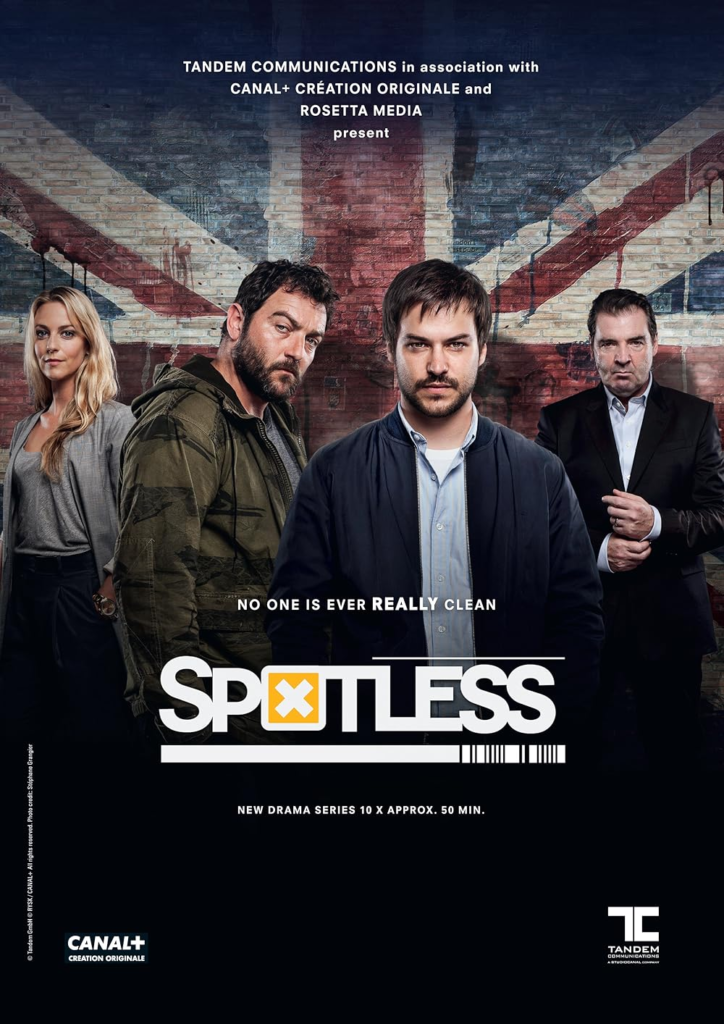Spotless Christian Review

Alright, let’s talk about Spotless. What do you get when you toss a meticulous crime scene cleaner, his erratic criminal brother, a ton of bleach, and a pile of messy life choices into the pot? Well, you get a TV series that’s darkly funny, unexpectedly poignant, and morally all over the place. It’s not a show that tiptoes into the underworld—it dives right in, cleaning supplies in tow, and then tries to crack a joke while everything crumbles. But does it work? Is it something worth watching if you’re trying to live out your faith while still appreciating quality entertainment? Grab a sponge (and maybe a Bible), because this is a complex one.
When Your Hero Is No Hero at All
From the very first episode, you’re introduced to Jean Bastiere, a guy who’s the definition of “neat freak,” but not in a way that makes you feel good about it. His skills in cleaning crime scenes are almost supernatural—he’s the man you call when a situation’s gone sideways and you need everything scrubbed down to a spotless gleam. But here’s the kicker: Jean’s professional skills are pristine, but his personal life is a complete wreck. He’s cheating on his wife, emotionally distant from his kids, and then, just when you think it can’t get more chaotic, his brother Martin shows up. Martin, the wild one, is a professional mess-maker, with a chaotic streak that cuts through everything.
What makes this dynamic interesting is that Spotless doesn’t give you a likable protagonist to cheer for. Jean is a blank slate, Martin’s a loose cannon, and every choice they make is layered with ambiguity. Are they redeemable? Should we even want them to be? These aren’t questions the show cares to answer—at least not right away. But as a Christian, I found myself wondering what it means to get invested in a story where no one’s even trying to be good.
Crime Scene Cleanup and the Gospel of Bleach
It’s odd—almost unnerving—how the show makes crime scene cleanup look like art. There’s a strange, eerie beauty in the way Jean meticulously wipes away bloodstains and restores the space to its “before” state, as if nothing tragic ever happened there. The cinematography draws you in, making you forget for a moment that what you’re watching is essentially the erasure of human tragedy.
The Bible talks about cleansing and renewal, but Spotless twists that idea in a sinister direction. Instead of purification, what we see here is a kind of superficial scrubbing—cleaning up the mess but never addressing the root problem. Jean’s obsession with cleanliness is almost pathological, hinting at an emptiness inside. It’s not about erasing sin; it’s about hiding it under layers of perfectionism. He’s good at his job, no doubt, but what’s the point of being spotless on the outside when your soul is a mess?
And yet, the show’s depiction of Jean’s work is so precise, so compelling, that you almost forget what he’s actually doing. It’s a dangerous seduction—the kind that draws you in with beautiful visuals and keeps you hooked with just the right amount of tension. But is it okay to admire the skill when the skill is being used to cover up evil? The Christian faith calls for discernment, for looking beyond appearances. In Spotless, appearances are everything—and that’s where the danger lies.
Dark Humor: Laughing at What Should Make You Cringe
One of Spotless’ biggest selling points is its dark humor. It’s not your typical sitcom-level funny—it’s more the kind of humor that catches you off guard, makes you laugh, and then leaves you feeling guilty for finding it funny. You’ll get scenes where Jean is in the middle of a gruesome cleanup, and then there’s a perfectly timed quip that shatters the tension, turning horror into hilarity. The creators, Ed McCardie and Corinne Marrinan, know how to wield humor like a scalpel—cutting through the grotesque with just the right amount of absurdity to make you forget what you’re actually watching.
But there’s a catch: while laughter can be a release, it can also desensitize. As a Christian, I’m wary of humor that makes sin and violence seem trivial. There’s a thin line between exposing the absurdity of evil and making evil feel entertaining. And Spotless often flirts with that line. When you find yourself chuckling at a botched crime or at Jean’s frantic attempts to keep his life from falling apart, it’s worth asking whether the show is using humor to illuminate the darkness—or just making it more palatable.
The Visual Allure of a Morally Messy World
There’s no denying that Spotless is a visually stunning show. The cinematography is sleek, the lighting atmospheric, and every frame seems carefully composed to highlight the contrast between cleanliness and chaos. It’s almost too beautiful—there’s a seduction in the visuals that pulls you in, making even the most disturbing scenes feel strangely captivating.
But there’s a spiritual risk in getting too comfortable with the allure of darkness. The Bible warns us to guard our eyes and hearts, to dwell on what is pure and good. When violence and moral decay are wrapped up in a package this visually appealing, it’s easy to lose your footing. You start to see beauty where there should be horror, and before long, you’re numb to the real ugliness underneath.
Spotless plays with this tension masterfully. It’s not just about crime and blood—it’s about what happens when the darkness starts looking too pretty, too polished. For a show that’s ostensibly about cleaning up messes, it leaves you feeling… unclean. There’s something toxic about enjoying something so sleekly packaged when the content itself is morally corrosive.
Should You Tune In? Navigating Murky Waters as a Christian Viewer
So, should a Christian watch Spotless? It’s not an easy yes or no. The storytelling is tight, the acting compelling, and the writing sharp. It’s entertaining in all the right ways—witty, suspenseful, and darkly funny. But it’s also a show that revels in moral ambiguity. The characters are complex but not exactly redeemable. The humor is clever, but it’s often at the expense of making light of evil. And the visuals, while stunning, risk glamorizing the very things we’re supposed to reject.
If you’re the kind of viewer who can separate fiction from reality, who can appreciate the craftsmanship without getting sucked into the moral quagmire, then Spotless might be worth a watch. But proceed with caution. It’s easy to get pulled in by the allure of its darkness, to find yourself rooting for Jean even as he makes one bad choice after another. And that’s where the real danger lies—not in the blood and crime, but in the slow, subtle erosion of your own moral compass.
Final Verdict: 6.5/10
Spotless is a gripping, well-made show with plenty to admire, but it’s not without its pitfalls. For a Christian viewer, it’s a show that demands discernment and a willingness to confront the darkness it so deftly presents. There’s brilliance here, but it’s wrapped up in a package that’s as messy as the lives it portrays. So, if you decide to dive in, just remember: some messes aren’t meant to be cleaned up—they’re meant to be avoided altogether.







